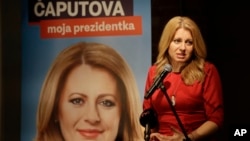Europe’s centrists will be looking this Saturday to Bratislava, hoping that a 45-year-old anti-corruption lawyer running on an avowedly liberal platform will win Slovak’s presidential elections, thereby bucking the continent’s populist trend.
The environmental activist, Zuzana Caputova, comfortably won the first round of the elections earlier this month with 40 percent of the vote and is facing off against European Commission Vice President Maros Sefcovic, who’s backed by the ruling leftist populist Smer-SD party.
Caputova is an icon of a new emerging generation of women leaders in Central Europe, but she is, above all, a liberal figure on a continent that’s preparing for a monumental political clash in May between pro-EU liberal and Euro-sceptic nationalist populist parties in elections for the European Parliament.
Liberal activists hope a Caputova win will act as a boost for centrists ahead of those polls, which have the potential, if nationalist populists win big, of sending shock waves across Europe and shaking up all European institutions. They also hope it will mark a turning point in central European politics, which have been dominated in recent years by nationalists like Hungary’s Viktor Orban. Next door, in the neighboring Czech Republic, a pro-Russian populist, Milos Zeman, is president.
Caputova, a divorced mother of two, who would become Slovakia’s first female president in the event she wins, has not been shy to cast the election as a major symbolic battle, even though the post is largely ceremonial and her opponent is hardly a populist firebrand.
The 52-year-old Sefcovic is an establishment figure but his efforts to distance himself from the country’s former prime minister, Robert Fico, who resigned last year in the wake of the murder of investigative journalist Jan Kuciak, hasn’t been helped by his association with the Smer-SD party.
The party was originally pro-EU but has become more skeptical and has adopted a hardline anti-migration stance.
The journalist’s murder, which shocked Slovak and triggered the largest street protests since the Velvet Revolution in 1989, prompted Caputova to enter electoral politics. She began to emerge as a political figure after heading a campaign to shutter a landfill in her home town of Pezinok. The landfill company has ties with a well-connected businessman who Slovak prosecutors have charged with ordering Kuciak's slaying. The killing, prosecutors allege, was ordered because of Kuciak’s probing of ties between businessmen, high-profile politicians and an Italian mafia group.
“If she wins, it will be proof that the majority of people in Slovakia care about their country and are fed up with the corrupt and criminal system of Mr. Fico,” according to liberal journalist Matus Kostolny.
Sefcovic has been pitching himself as a defender of Christian values in his bid to attract voters on the right of the political spectrum and has criticized Caputova as “a proponent of the liberal agenda.” He has attacked her for approval of same-sex marriage, same-sex adoption and for her pro-migration stance, but the LGBT issues, which should have played well for him in the largely Catholic country, have failed to have had much impact on the campaign, according to analysts.
“One does not seem to have to abandon their values, one can be authentic and true, and not have to choose a populist vocabulary to address voters – maybe just the opposite,” Caputova told supporters after her first-round success.
Local polls taken two weeks ago predicted Caputova could win handsomely with 60 percent of the vote in the run-off with Sefcovic. The killing of Kuciak — he was murdered alongside his fiance Martina Kusnirova — appears to be shaping public opinion in the lead-up to voting.
There have been year-long protests about the murder, and the slaying has fed into public disgust generally about rampant public corruption and cronyism. The EU's civil liberties committee last month expressed worries about corruption, organized crime and judicial independence in Slovakia.
Caputova's rise from little-known political newcomer to the front-runner has surprised traditional politicians. When she started on the campaign trail her polling numbers were in single digits but support skyrocketed for her after televised debates between the presidential candidates.
Focus groups conducted by pollsters after the debates found voters favoring Caputova saw her as fresh, moral and decent and said the country needed a major change.
“Firstly, people are desperate and tired of the emptiness of current Slovak politics; secondly, by bad governance and overwhelming corruption; and most importantly, by the ugliness of public life, which is full of aggressiveness, rough interactions, and an almost psychopathic brutality,” sociologist Michal Vasecka told the Slovak Spectator magazine.






